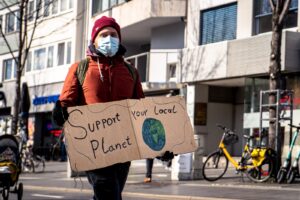WHO declares health must be at the centre of COP27 negotiations
The World Health Organisation (WHO) believes health should be at the centre of the climate change convention, as it issues a reminder that the climate crisis contributes to ill health, threatening lives globally.
Launched in Egypt yesterday, authorities have gathered from around the world to discuss the growing climate change problem.
Dr Tedros Adhanom Ghebreyesus, the Director of WHO said: ‘Climate change is making millions of people sick or more vulnerable to disease all over the world and the increasing destructiveness of extreme weather events disproportionately affects poor and marginalized communities.
‘It is crucial that leaders and decision makers come together at COP27 to put health at the heart of the negotiations.’
The United Nations Agency has stated the condition of our health ‘depends’ on the health of the ecosystem. Due to animal habitats being infected by dirty substances from river pollution, opportunities for humans to be exposed to harmful viruses have increased.
WHO reports between 2030 and 2050, climate change is expected to cause around 250,000 deaths per year from malnutrition, malaria, diarrhoea and heat stress.
Likewise, the rise in global temperature is also leading to major weather events that bring intense heatwaves, floods, droughts and hurricanes.
The independent organisation has discovered 31 million people in the greater Horn of Africa are facing acute hunger and 11 million children are suffering from malnutrition as the region is experiencing one of the worst droughts in decades.
Climate change already has an impact on food security and if current trends persist, ‘it will only get worse,’ WHO reports.
The independent health organisation recalls the floods that happened in Pakistan in June, which over 33 million people were affected by and almost 1500 health centres were damaged, and notes regions that are not affected by extreme weather conditions should be protected to prevent anything like this from happening again.
A solution to protecting people’s health, WHO advises, is governments should invest in clean energy tactics which are proven to reduce emissions of short-lived climate pollutants, such as applying higher standards for vehicle emissions that have been calculated to save 2.4 million lives per year.
As well as calling on the government, WHO has also stated citizens around the world can contribute to improving people’s health by promoting more green spaces, campaigning for local traffic restrictions and enhancing public transport systems.
The key themes surrounding COP this year include financing, mitigation and adaptation and agriculture, which WHO has said the conference must conclude with progress on by the time it ends on 18th November.
Photo by Mika Baumeister
















